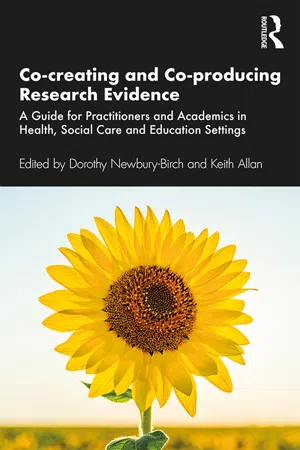Understanding the context
Understanding the context a co-production project is to be conducted in is key and can include prioritising limited resources to meet health needs, something of a particular challenge in areas like the North East of England where health outcomes remain stubbornly lower than the England average and where there is substantial (perceived or actual) unmet heath needs. There is much to consider with regard to how interventions are evaluated to demonstrate adding value to the local system without the requirement for a randomised control trial.
There is prolific delivery in local public health teams where the evidence base has been interpreted and applied within the local context but we are often left unsure of whether there is a difference being made to local people/recipients of the interventions unless robust evaluation is wrapped around an intervention.
Additionally, there is perhaps an assumption that commissioning decisions are linear. These decisions are subject to strict funding regimes, are bound in political tensions (national and local), follow a strict timeline and are led by one individual whose focus is just on that commission.
Considering all of the above, the importance of the context is clear. Good understanding of its potential impact by researchers is therefore clearly beneficial and can be supported through the co-production process. This is likely to provide deeper learning and robust research findings that are more likely to be applicable to the environment a practitioner works within.
Translational research and translational practice
Having worked in public health practice for some time, we have also advocated that the focus on ‘translational research’ or knowledge exchange, has often been considered as one directional – how to get the research evidence into practice. There is often a very long time lag to get published research into practice with this taking as long as 17 years (Morris et al. 2011). Yet rarely do we hear how can practice inform research. The more recent focus on the need for research funders to look at ‘natural experiments’ is promising but underutilised (Petticrew et al. 2005).
Case studies are used to share ‘good’ or ‘promising’ practice – but who said it’s good and will it translate here? Therefore, case studies are read with interest but are often not replicated as the local context remains pivotal to successful implementation.
Implementation science is commonly defined as the study of methods and strategies to promote the uptake of interventions that have proven effective into routine practice, with the aim of improving population health. Implementation science therefore examines what works, for whom and under what circumstances, and how interventions can be adapted and scaled up in ways that are accessible and equitable (Michie et al. 2009). The field of implementation science has been born as a result of recognising the importance of the gap between research and practice (Glasgow et al. 2003). This gap has expedited the use of multitudinous theoretical constructs, aiming to enhance the implementation process, identify the barriers and facilitators and acting as valuable tools in evaluating implementation (May and Finch 2009). For public health practitioners endeavouring to implement evidence based practice, understanding the barriers and enablers to practical implementation are critical in the field. Undertaking local level evaluation, with implementation science domains, is a step towards understanding the context in which to apply evidence based research.
Academic drivers
One of the major barriers to engaging academics in co-production work within certain public health practitioner settings is the constraint put on the type of experiment that can be conducted. It would be unusual to be able to carry out a randomised controlled trial (RCT) in a local authority setting for example. While some methods would allow controlled evaluation of new initiatives as they are rolled out (e.g. stepped wedge cluster randomised trial) (Hemming et al. 2015), the majority of projects are likely to be observational or implementation studies. Due to the hierarchy of evidence and the academic drive to publish in high impact journals these settings may initially seem less attractive to academics (Newbury-Birch et al. 2016). However, through engaging in such co-production projects academics will gain access to new types of data and study subjects and may, for example, provide an excellent opportunity to generate important qualitative research (Newbury-Birch et al. 2016). Furthermore, it provides a welcome opportunity for academics to see their research put into practice. In order to create robust partnerships these benefits should be strongly communicated.
So, what was the model?
As a result of the difficulties and barriers described above, we agreed it would be more effective and cost effective to employ a researcher for a year rather than spend the small sums of funding on poor quality discrete pieces. The postholder was employed by a university, worked for three days a week in the Institute and two days a week in the practice location. Thus, the embedded researcher became straddled across two worlds – the researcher in the middle then benefitted from understanding the context of place, priorities and politics (Newbury-Birch et al. 2016).
A steering group was established to agree the areas of practice that would benefit from rapid evaluations, and the practitioners leading these workstreams became aligned with the researcher to drive forward the research programmes.
Sharing co-production evaluation learning and publication
One of the key aspirations of the co-production evaluation programme has always been to achieve publication within peer-reviewed journals. The opportunity for public health practitioners to develop the skills and competence to undertake quality assured evaluations and subsequently participate in the development of a peer reviewed journal article is not something often available at practitioner level.
During the course of the co-production evaluation journey there have been many opportunities to submit poster presentations to conferences such as Public Health England conference. These conferences are expensive to attend and often the cost renders them prohibitive for public health practitioners. Participating in co-produced evaluations with the embedded researcher has opened doors for practitioners to attend these conferences and share their learning with broader audiences.
